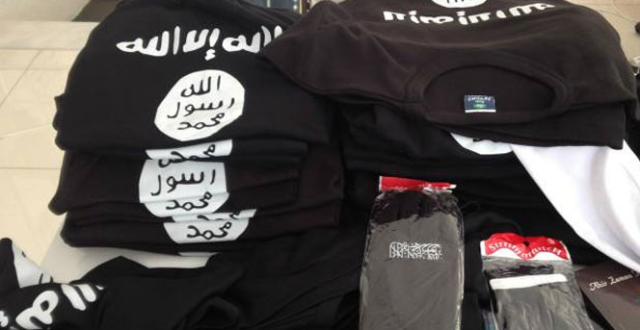Abdullah Bozkurt/Stockholm
An affidavit filed in US federal court details how an American man exploited Turkey’s position as a key transit hub for jihadist fighters to attempt to join the Islamic State in Iraq and Syria (ISIS) in Syria, confirming legally what has been known all along by Turkey observers.
Filed in the Northern District of Florida, the affidavit from the Federal Bureau of Investigation (FBI) accused 38-year-old Mohamed Fathy Suliman, a US citizen born in Washington, D.C., of plotting his travel to ISIS-held territory by disguising his true destination from his family, booking a one-way ticket from Orlando to Alexandria, Egypt, via Istanbul.
Instead of boarding his scheduled Turkish Airlines flight from Istanbul to Alexandria, Suliman paid cash at an airport tourism desk for a business-class ticket to Gaziantep — a Turkish city located roughly 35 miles from the Syrian border and, at the time, a major staging ground for ISIS recruits.
According to the FBI, Suliman admitted during a 2018 interview at the US Embassy in Khartoum, Sudan, that he had researched online how to reach Syria using ISIS-linked websites. Those instructions, he said, directed him to travel through Istanbul and on to Gaziantep, where he was told to stay at local hotels and seek out guides who could arrange an illegal crossing into Syria.
The affidavit states that this method mirrored the movement of many foreign fighters between 2013 and 2015, when Turkey’s southeastern provinces, including Gaziantep, Şanlıurfa and Kilis, were used as gateways to ISIS territory in Syria. Smugglers and local facilitators would take recruits from city bus stations to informal crossing points, bypassing official border controls.
Most were allowed to cross the border by the Turkish authorities, and the ones detained by local police or gendarmes were quickly released.
The FBI affidavit details Mohamed Fathy Suliman’s plans to join ISIS in Syria via Turkey:
On June 14, 2014, Turkish border guards detained Suliman between border markers 501 and 502 near the East-5 watchtower in Kilis province as he attempted to cross into Syria under cover of darkness. He was reportedly with a group of foreign nationals, transported in a minivan by a driver who accepted $50 per person for the crossing.
Kilis, located about 40 miles from Aleppo, was then a strategic entry route for ISIS. At the time thousands of foreign fighters are believed to have crossed from Turkey into Syria through such illicit routes, often ending up in Aleppo province, which was under heavy ISIS influence.
Suliman spent 10 days in Turkish detention, during which time he was fingerprinted and questioned. Turkish authorities fined him 2,000 lira (some $900 US) for the illegal crossing. What is more, instead of alerting the US Consulate about his detention, Turkish authorities, at his request, deported Suliman to Sudan on June 19, 2014. Records show he flew from Gaziantep to Istanbul and then onward to Khartoum on Turkish Airlines, paying in cash.
The FBI affidavit notes that Suliman later admitted his intent was to meet members of ISIS, the al-Nusra Front and other jihadist factions. He claimed he wanted to assess each group before deciding whom to support, offering his English-language skills for propaganda purposes and possibly arranging financial support from his father.
Suliman has long been on the radar of US law enforcement agencies. He first attracted attention in 2009 when he was detained while attempting to enter Somalia, allegedly to join the terrorist organization al-Shabaab. Because of this record, he was put on a list of passengers deemed a security risk. In 2011 his attempt to fly from Istanbul to New York on a Turkish Airlines flight was foiled, and he was directed to contact the US Consulate.

The FBI interviewed him at the US Consulate General in Istanbul, where he claimed to suffer from bipolar disorder, panic attacks and depression. He said he had traveled to Somalia after stopping his medication.
It remains unclear why Suliman was not flagged when he traveled on a one-way ticket to Turkey in June 2014, abandoned the final leg of his connecting flight, stayed in Istanbul and then took a domestic flight to a border city in an attempt to cross into Syria. Turkish authorities were aware that he had been barred from boarding a US-bound flight in 2011 and likely had a record of him that should have put his name on a security-risk list for foreigners. Instead of being denied entry, he was allowed to pass through customs and immigration without incident.
Turkey’s National Intelligence Organization (MIT), acting under the directives of the government of President Recep Tayyip Erdogan, had been facilitating the transfer of foreign fighters into Syria as part of efforts to topple the Bashar al-Assad regime. At the time this policy created significant friction between MIT and the Turkish military, which was tasked with securing border areas and opposed Ankara’s support for radical jihadist groups.
Senior generals who opposed the government’s pro-jihadist stance were summarily removed from their posts after a coup attempt in July 2016, which has been described as a false flag operation used to justify the purge of nearly two-thirds of all generals and admirals from NATO’s second-largest army in terms of manpower.
The case underscores Turkey’s role at the time as the primary overland route for aspiring ISIS members from around the world. US and European intelligence services have documented numerous cases of militants flying into Istanbul and then traveling south by domestic flight or bus to border provinces. From there, ISIS facilitators arranged illegal entry into Syria via rural paths, olive groves or river crossings.
Plea deal for Mohamed Fathy Suliman, who pleaded guilty to the charge:
The affidavit explicitly states that Suliman’s actions “are consistent with similar cases in which individuals desiring to join ISIS would use Turkey as a transition point to enter Syria,” and that Kilis was “an important overland route for ISIS travel to and from Turkey to Syria,” according to FBI Special Agent R. David Collins, who had investigated multiple instances of US nationals seeking to join ISIS through Turkey.
In September 2020, Suliman was charged with attempting to provide material support to a designated foreign terrorist organization, an offense carrying a potential 20-year prison sentence. He was arraigned in March 2021 and faced the prospect of additional criminal charges. In April 2023 he pleaded guilty to one count of attempting to provide material support to a designated foreign terrorist organization in exchange for a commitment from the US Attorney’s Office for the Northern District of Florida not to pursue further charges.
In October 2023 Suliman was sentenced by a federal judge to three years in prison and supervised release for the rest of his life.
The FBI’s account paints Suliman as a textbook case of how ISIS exploited Turkey’s geography, infrastructure and permissive border environment during the height of its expansion in Syria and Iraq.












